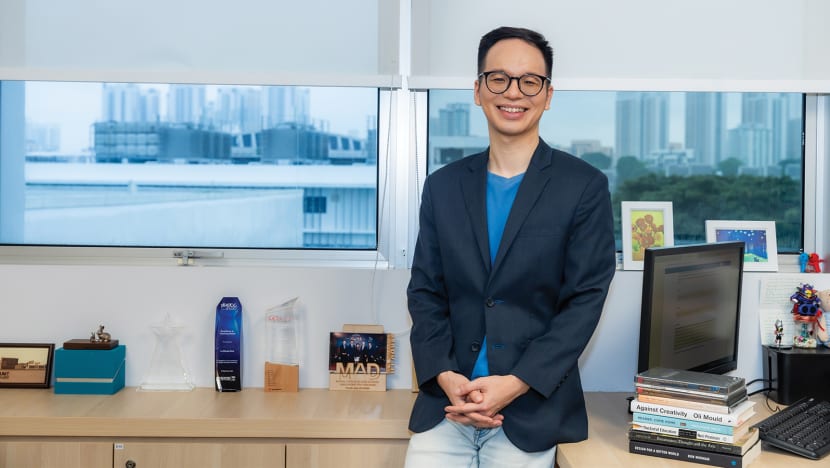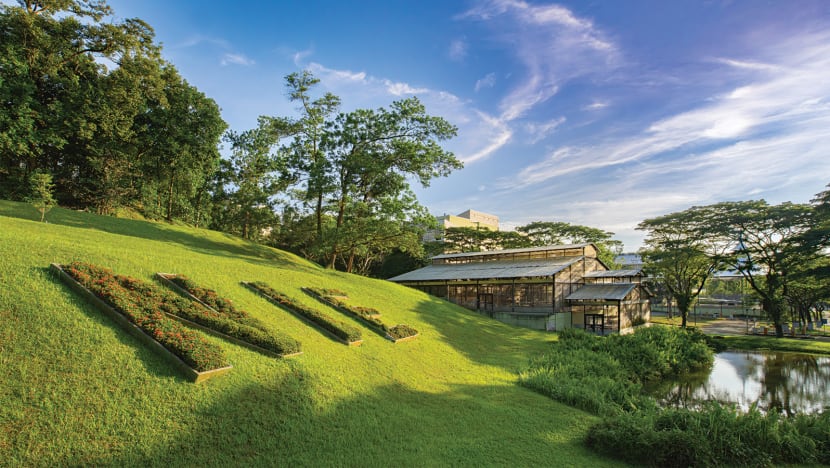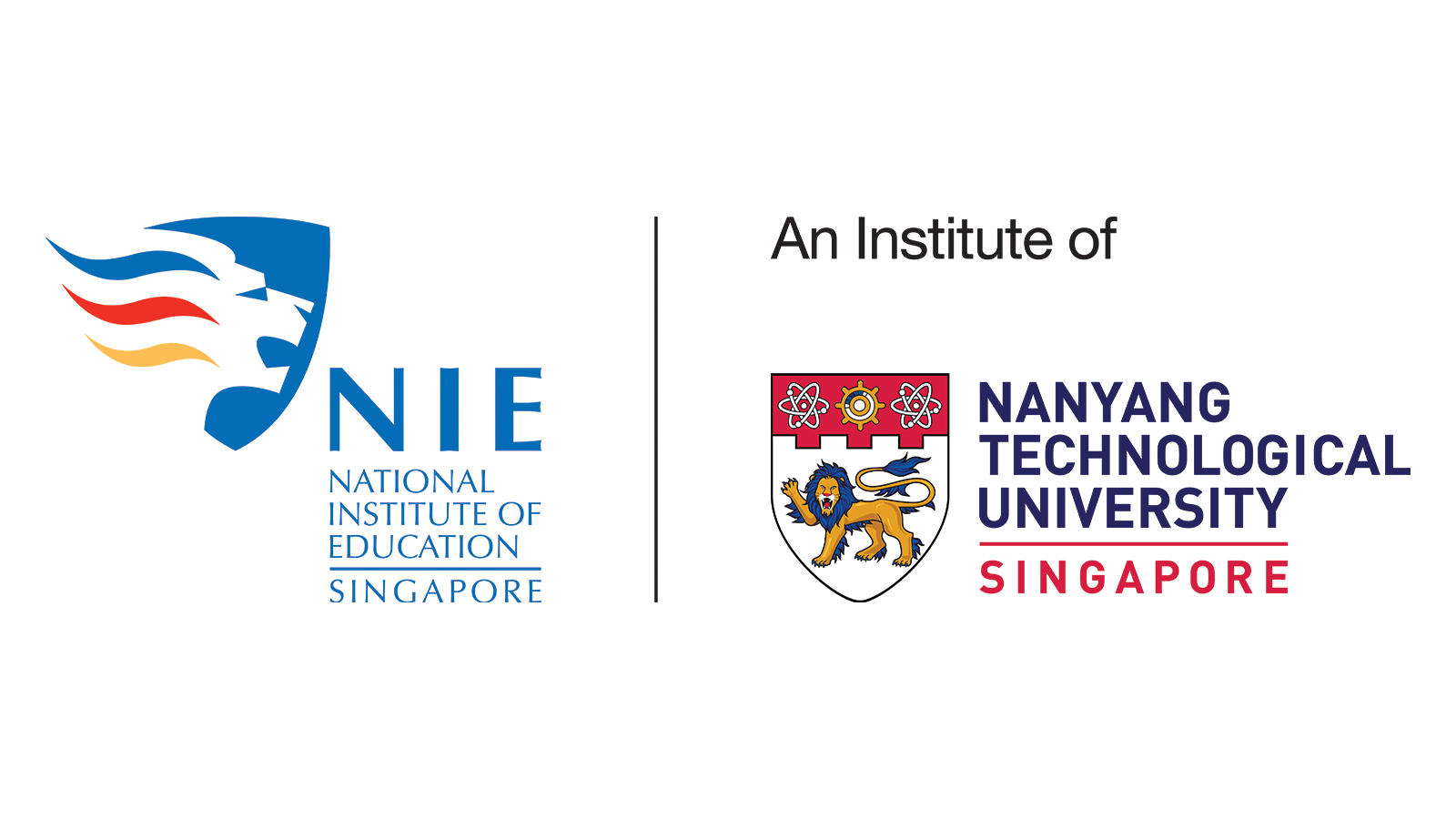From classroom to curriculum: How one educator is rethinking teaching for today’s learners
Through NIE NTU’s Master of Education programme, Mr Mark Lu discovered the power of diverse perspectives, gained fresh insights into curriculum design and helped shape a transdisciplinary approach that’s transforming how students learn.

NIE's graduate programme deepened Mr Mark Lu's insights into the complex forces and key players shaping education policy and curriculum decisions. Photos: NIE NTU, Singapore

This audio is generated by an AI tool.
As director of the Media, Arts & Design School at Singapore Polytechnic, Mr Mark Lu believed that giving students creative freedom in their learning was the best way to impart knowledge. Interestingly, not all his classmates at the National Institute of Education, Nanyang Technological University, Singapore (NIE NTU, Singapore), saw it the same way.
Two fellow students in the Master of Education (Curriculum and Teaching) programme – one from the military and the other from healthcare – shared a contrasting perspective. In their fields, strict adherence to instructions was often critical, with real consequences in life-or-death situations. This eye-opening insight into the need for different teaching approaches deepened Mr Lu’s interest in education.
Mr Lu had enrolled in the part-time graduate programme at NIE after a conversation with his supervisor sparked a realisation: He wanted to better understand education policy, pedagogy and curriculum, and how he could better support lecturers in their work.
LEARNING FROM MANY, TEACHING FOR ALL
With over 30 graduate programmes and courses designed to sharpen critical thinking, enhance professional skills and open up new career paths, NIE attracts a growing number of students from a wide range of industries and countries. Their diverse perspectives and experiences enrich classroom discussions and learning for everyone.
This diversity mirrors the changing student population in polytechnics. Mr Lu observed that today’s polytechnic students come from increasingly varied educational backgrounds and life stages. Many are working adults returning as full-time students or trainees, each with their own goals and life experiences.
As a result, polytechnic lecturers must adopt a flexible mindset and be equipped to teach both technical and soft skills. “They need to design meaningful classroom experiences that inspire and motivate students from all walks of life and help them work toward their aspirations,” Mr Lu explained. “At the same time, they have to balance a rigorous curriculum that builds resilience with an awareness of students’ well-being.”
In such a setting, having a wide-ranging community of fellow educators is important. Mr Lu, who graduated in January this year, said that the diverse student body at NIE was his favourite part of the programme.
“I met classmates from countries like China and Vietnam, and others from fields like the military, nursing, human resources and private education. Each of them is an educator in their own way, and they brought very different yet valuable perspectives on curriculum and teaching.”
Mr Lu added that his NIE chat groups remain active. One of his classmates even works in the same polytechnic, though in a different school, and they’ve explored opportunities to collaborate.
EXPANDING MINDS THROUGH TRANSDISCIPLINARY EDUCATION

For Mr Lu, the graduate programme at NIE offered more than just academic knowledge – it refined his understanding of the many factors and stakeholders involved in shaping curriculum decisions and education policy.
“The course on globalisation and curriculum reform gave me a broader view of Singapore’s education landscape and helped me better understand why schools are structured and managed the way they are,” he shared.
He especially appreciated how classroom assignments encouraged students to apply what they learned to real-world contexts. Rather than working through fixed case studies, Mr Lu and his classmates were asked to explore how key concepts played out in their own workplaces. “This pushed me to think more critically about my work and how I can better support both lecturers and students in my school,” he said.
Before taking on the role of director, Mr Lu led his school’s transdisciplinary unit – a team focused on developing a curriculum that helps students build transdisciplinary skills. This approach encourages students to draw from different disciplines and integrate multiple perspectives when solving problems.
With insights gained from NIE courses on curriculum development, Mr Lu and his team designed a series of transdisciplinary studio projects, where students from different creative disciplines worked together to solve social issues and industry briefs innovatively. These projects received positive feedback from industry partners, who were impressed by the students’ ideas.
Thanks to the research courses he took at NIE, Mr Lu was also able to collaborate with his colleagues on developing a three-year longitudinal study examining the impact of his school’s transdisciplinary curriculum. The study has since been presented at both local and international academic conferences.
“Through the transdisciplinary curriculum, our students are becoming more comfortable with ambiguity and more willing to take creative risks – traits that are essential in any creative field,” Mr Lu noted. “We’re now working on developing our own instrument to measure transdisciplinary thinking.”
Enrolling in NIE and becoming a student again has reshaped Mr Lu’s perspective. Once focused mainly on day-to-day teaching, he now views his work through a broader, more philosophical lens.
He is also keen to continue an educational journey that he finds deeply fulfilling. “I believe continuous learning is a fundamental part of our work. We don’t just teach for others to learn – we learn to teach, and we keep learning while we teach. Though I’ve completed my Master’s programme at NIE, I am excited to learn more when I embark on my PhD in August.”
Applications for the January 2026 graduate intake at NIE NTU, Singapore, are now open. Apply by Jun 19, 2025, for coursework programmes, and Jul 24, 2025, for research programmes.















